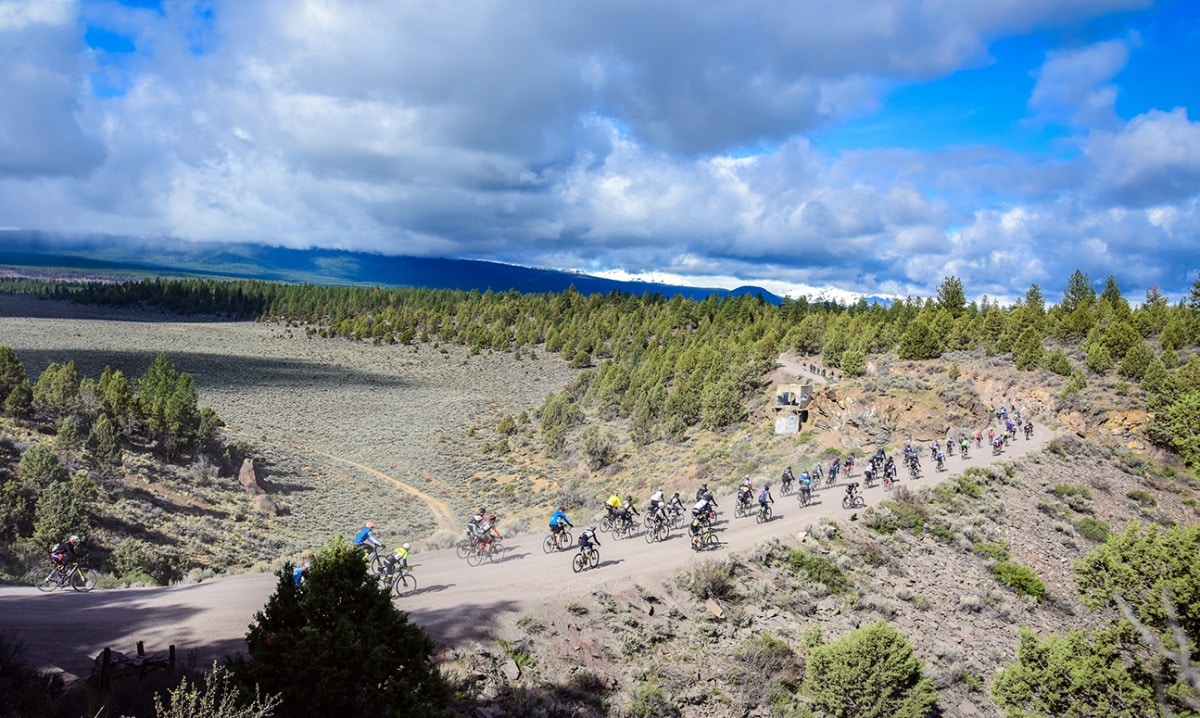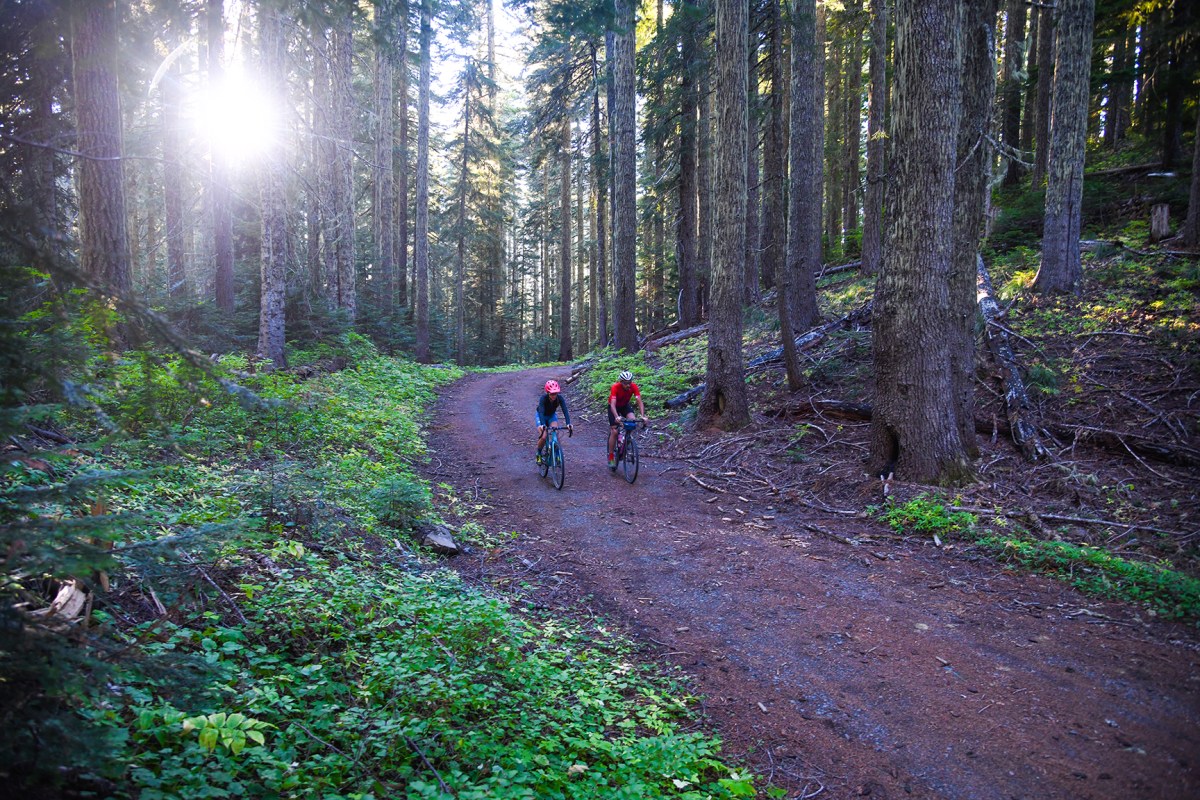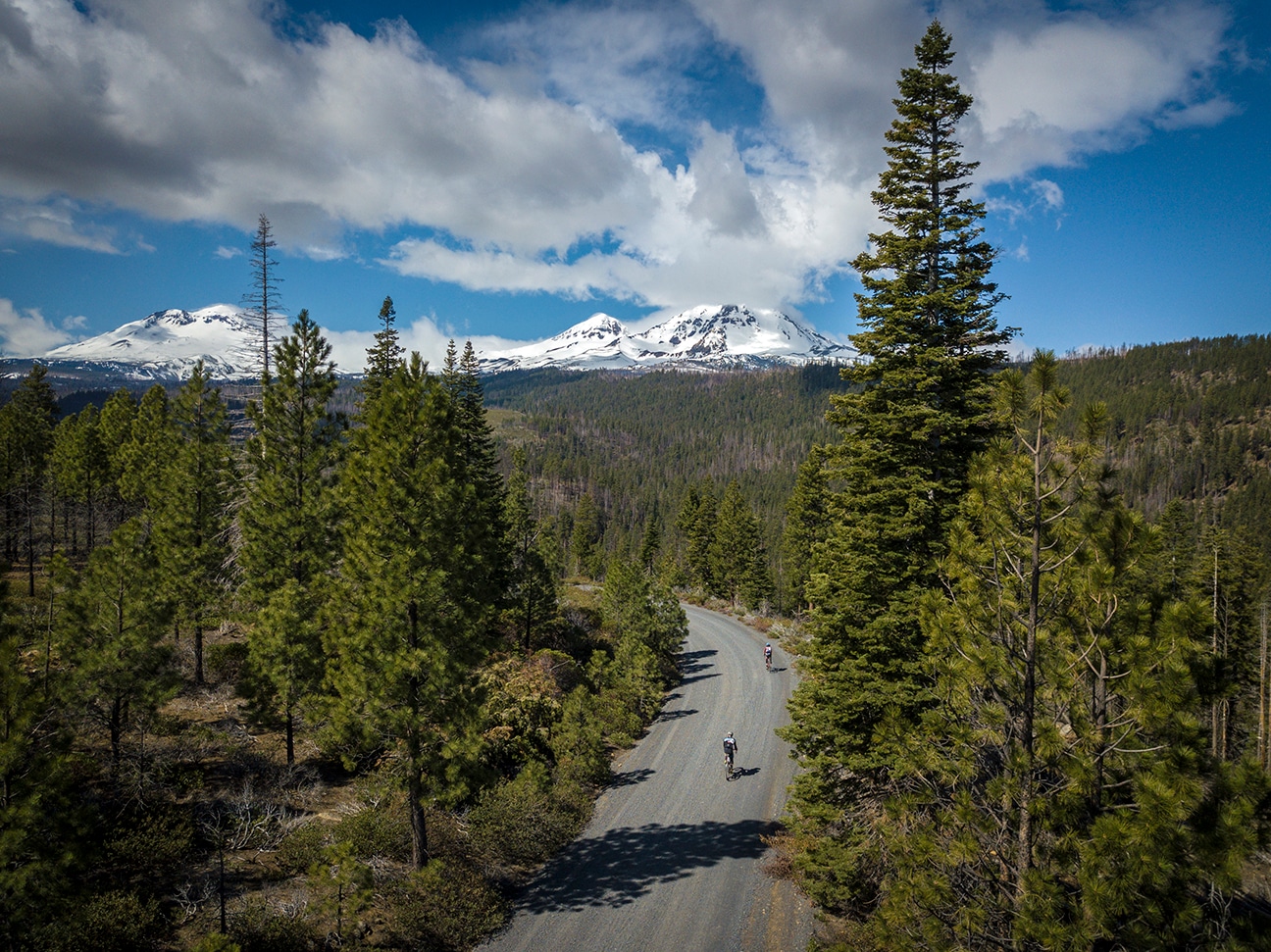Six miles from the start line in the sleepy, eastern Cascades outpost of Sisters, the Oregon Trail racecourse veers off the asphalt of the McKenzie Highway onto the knotty, rutted, occasionally sandy Santiam Wagon Road and, for the remainder of the event’s 350 miles, largely doesn’t return to pavement. Promising five days of pedaling on some of the most scenic back roads in the Pacific Northwest, the Oregon Trail Gravel Grinder debuts in June as the self-proclaimed first gravel stage race in the country. More than just another cycling bucket list event, however, this new, five-day ride offers a glimpse into the evolution of U.S. road riding, from the hard-charging racing days of the Lance Armstrong era to the emergence and ascendancy of gravel.
“We have been working on the road racing side of events for two decades, and lately we’ve seen nothing but decline,” said Chad Sperry, owner of Breakaway Promotions, the company behind the Oregon Trail. “But our gravel events are exploding.”
Gravel cycling isn’t exactly new—cyclists have been riding drop handlebars and skinny tires on mixed terrain in events like Paris-Roubaix since the turn of the 20th century—but it’s only really taken hold as a genre in the last four or five years. Unbound Gravel, which has developed into one of the best-known gravel race in the country, coasted along as a relatively grassroots, local event until 2013, when its registration numbers nearly doubled to around 1,000—since then, it’s almost tripled again. And it wasn’t until 2014 that Salsa, one of the earliest proponents of the genre, launched its first dedicated gravel bike, the Warbird Ti. Despite that novelty, however, road bikes with fatter tires and more forgiving riding positions have commanded the market in the last few years. Gravel was the fastest-growing bike category in 2017 and the only road subcategory that didn’t contract in 2018.
Some of that momentum can be chalked up to disenchantment with road riding, both from its decades of scandals and “doping baggage,” as well as its stoic focus on competition. “The ‘Lance effect’ is a big factor in the shift away from road racing we’ve seen since 2010,” said Neil Shirley, one of the country’s most-decorated domestic road racers of the last decade who now works as marketing manager at Enve wheels. “People have gravitated to gravel events because they offer a different experience and inclusive atmosphere compared to what the road scene was delivering.” The increased risks associated with traffic and distracted drivers are also fueling gravel, according to Sperry. “In central Oregon, [in Bend,] we’ve seen the population quadruple in the last 25 years, but the paved road infrastructure hasn’t kept pace,” said Sperry. “From a safety and enjoyment standpoint, of course cyclists are turning to dirt roads.” Technology has driven gravel’s rise, too, as manufacturers have stepped up and adapted drop-bar bikes to the demands of dirt. “In only a few years, bikes have improved in almost every way,” said Joe Meiser, a senior product manager at Salsa Cycles who has worked on most of the company’s gravel offerings. “Disc brakes, stable geometries, frame compliance, and, one of the last missing components, big-volume tires and clearance for them … it’s all added up to enjoying the ride not just enduring it.” The addition of high-quality, but affordable models like Salsa’s Journeyman and Cannondale’s Topstone has further fed the interest.
But gravel’s rise is also a cultural phenomenon. Incubated in the Midwest, where long passages of dirt are an inescapable part of the road riding landscape, the genre has earned a reputation for rootsy but also hardcore races (hence: “gravel grinding”), thanks to epic seminal events such as Almanzo, Trans Iowa and Unbound Gravel.

Photo Credit: Adam Lapierre/Oregon Trail Gravel Grinder
Lately, though, more and more events are surfacing that forgo the suffering for a laid-back, community-oriented, festival approach. From new race-focused events that are offering more approachable options and post-event block parties (think: SBT GRVL) to whole new ride series that place a premium on the community experience over competition, such as Rebecca’s Private Idaho, gravel is embracing its tradition of inclusion. “I think that gravel got its footing thanks to the big, more grueling events because they are noteworthy,” said Nick Legan, author of Gravel Cycling, the definitive book on the subject. “There’s always going to be a place for rides where people can really test themselves. But now the focus is shifting more toward inclusiveness and community.”
Case in point: the Oregon Trail Gravel Grinder, which will travel a 350-mile loop through the Cascades from Sisters, 30 minutes north of Bend. Averaging 70 miles of riding for each of its five days, the event is no walk in the park. But the route is a lot more manageable than many old-school epic gravel events, and there are categories for riders seeking shorter and easier options. Sperry said that while the course, which travels empty, red cinder roads through high-desert plains and moss-swathed rainforests, is a big part of the appeal, so is the atmosphere and community. The ride will assemble around a pop-up camp each night—organizers plan to transport participants’ gear for them while they are riding, and will even erect personal tents for a small fee, with catered meals, a beer garden, live music and other entertainment. “We wanted to make something challenging, but attainable,” Sperry said. “Beyond just the ride, we want people to have energy to socialize and engage when they get to camp. It’s about the humanity of it.”
Breakaway promotions is also offering a $10,000 cash purse, which should entice top talent to the race, much the way Unbound Gravel lured retired pro racers Sven Nys, Jens Voigt and Ted King in 2018. Getting to line up side by side and spend nights around the campfire with such stars simply reinforces gravel’s democratic character. “Fast or not, we’re all out there together for the same reasons,” Sperry said. Yuri Hauswald, the 2015 winner of the Unbound Gravel is planning to ride the Oregon Trail, but not just for a chance at the winnings. According to Hauswald: “It’s like summer camp for adults.”

Photo Credit: Adam Lapierre/Oregon Trail Gravel Grinder
The Oregon Trail isn’t alone in its mellow approach. A new Colorado ride series called Roll Massif promises a collection of road and gravel events based around local communities throughout the state in 2019. The gravel rides will adhere to an enduro-style format, with a day of friendly group riding interspersed with a few short, timed segments for those who want to compete. “Folks want to get out there and have a physical challenge, but racing really isn’t the driver,” said Ben Delaney, head of communications for the events. “We want people to finish tired, but stoked.” Grinduro, which pioneered in 2015 the timed-segment-race in the midst of a weekend party at its Quincy, California, home locale, is this year expanding to four events worldwide (Canada, Scotland and Japan), as well as adding more manageable Grindurito categories for riders looking for a longer post-ride happy hour. And Rooted Vermont, a new event hosted by King and his wife, Laura, out of their hometown in Richmond this August, is promising two courses, one 45 miles and the other 85. The distances will allow everyone to enjoy the ride and a post-event gathering at mom-and-pop mountain Cochran’s Ski Area, featuring locally sourced food and IPAs. Absent from its billing—“Gravel Trails, Adventure, Community”—is any mention of racing.
“Whereas road cycling presents a series of hurdles to entry, gravel is warm and welcoming,” said King, who has become a bit of an acolyte for the cause since he quit the UCI Pro Tour, even winning the 2018 edition of Unbound Gravel. King said he appreciates the ease of entry and cooperative nature of gravel, two traits he hopes to bring to his event. “Rather than choking down a recovery drink, we’re racing for the celebratory beer.”
Registration for the inaugural Oregon Trail Gravel Grinder is open now. Half of the 500 slots are already accounted for, and Sperry expects the event to sell out.
